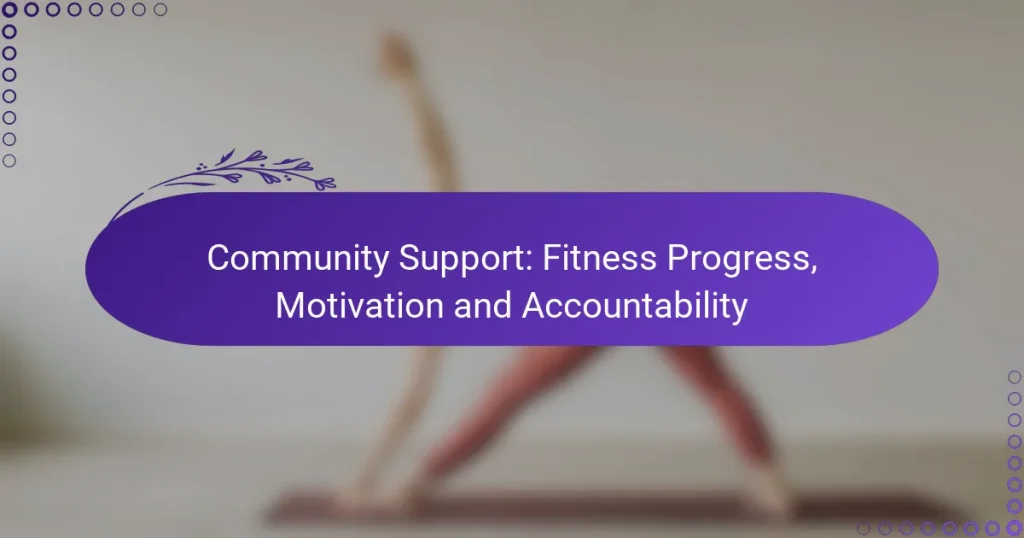Community support plays a vital role in enhancing fitness progress by creating an environment of shared commitment and motivation. This collective effort not only encourages individuals to set and achieve their health goals but also fosters accountability, ensuring that members stay engaged and support one another throughout their fitness journeys.

How does community support enhance fitness progress?
Community support significantly enhances fitness progress by fostering a sense of belonging and shared commitment among individuals. This collective environment encourages participants to stay motivated and accountable, ultimately leading to better results in their fitness journeys.
Increased motivation through group accountability
Group accountability boosts motivation by creating a social contract among members. When individuals commit to shared goals, they are more likely to follow through on their fitness plans, knowing that others are counting on them.
For example, joining a local running club can encourage participants to show up for scheduled runs, as the presence of peers provides an extra push to stay consistent. Setting group challenges, such as a monthly fitness goal, can further enhance this accountability.
Access to shared resources and knowledge
Community support provides access to a wealth of shared resources and knowledge that can enhance fitness progress. Members often exchange tips, workout routines, and nutritional advice, which can lead to more effective training strategies.
For instance, a fitness group may organize workshops on meal prep or host guest speakers on injury prevention. This collaborative sharing of information can help individuals make informed decisions about their fitness journeys.
Emotional support from peers
Emotional support from peers plays a crucial role in maintaining motivation and resilience during challenging times. Sharing struggles and celebrating successes within a community can foster a sense of camaraderie that helps individuals push through obstacles.
For example, a fitness group might create a private online forum where members can share their experiences and encourage one another. This support network can be invaluable, especially when facing setbacks or plateaus in progress.

What role does motivation play in fitness communities?
Motivation is crucial in fitness communities as it drives individuals to set and achieve their health goals. It fosters a sense of commitment and accountability, encouraging members to stay engaged and support one another throughout their fitness journeys.
Goal setting and tracking progress
Setting clear, achievable goals is essential in fitness communities. Members often establish specific targets, such as losing a certain amount of weight or completing a particular workout regimen within a set timeframe. Tracking progress through apps or community boards can help maintain focus and provide a sense of accomplishment.
Regularly reviewing goals and progress allows individuals to adjust their strategies as needed. For instance, if a member is not seeing expected results, they might consider altering their workout routine or nutrition plan. This adaptability is key to long-term success.
Inspiration from success stories
Success stories within fitness communities serve as powerful motivators. When members share their achievements, whether it’s completing a marathon or achieving a personal best, it inspires others to pursue their own fitness goals. These narratives create a supportive environment that celebrates progress, no matter how small.
Communities can highlight these success stories through newsletters, social media, or group meetings. By showcasing real-life examples, members can visualize their potential and feel encouraged to push through challenges. This shared inspiration strengthens the community bond and reinforces the importance of collective motivation.

How can accountability improve fitness outcomes?
Accountability can significantly enhance fitness outcomes by fostering a sense of responsibility and commitment among individuals. When people know they are being monitored or supported by others, they are more likely to stay on track with their fitness goals and maintain motivation.
Regular check-ins with group members
Regular check-ins with group members can create a supportive environment that encourages consistent effort. These check-ins can take various forms, such as weekly meetings, online updates, or even quick text messages. The key is to establish a routine that keeps everyone engaged and accountable.
During these check-ins, members can share their progress, discuss challenges, and celebrate achievements. This communal aspect not only boosts motivation but also helps individuals feel less isolated in their fitness journeys.
Structured workout schedules
Structured workout schedules provide a clear framework for individuals to follow, making it easier to commit to their fitness routines. By having specific days and times designated for workouts, individuals are less likely to skip sessions. This structure can be tailored to accommodate different fitness levels and preferences.
For example, a group might agree to meet every Tuesday and Thursday at 6 PM for a group workout. This consistency helps members build habits and reinforces their accountability to one another. Additionally, incorporating variety in the schedule can keep workouts engaging and prevent burnout.

What are effective community support strategies for fitness?
Effective community support strategies for fitness include fostering connections through group activities, online platforms, and fitness applications. These strategies enhance motivation, accountability, and a sense of belonging, which are crucial for achieving fitness goals.
Group workouts and challenges
Group workouts and challenges create a dynamic environment where individuals can exercise together, fostering camaraderie and motivation. Participating in activities like boot camps, running clubs, or fitness challenges can significantly boost commitment and enjoyment.
To maximize benefits, consider joining local fitness groups that align with your interests, whether it’s yoga, cycling, or high-intensity interval training. Setting common goals, such as completing a marathon or a weight loss challenge, can enhance accountability among participants.
Online forums and social media groups
Online forums and social media groups provide platforms for sharing experiences, tips, and encouragement. These communities allow members to connect with like-minded individuals, share progress, and seek advice, which can be particularly beneficial for those who may feel isolated in their fitness journey.
When engaging in these online spaces, look for groups that focus on your specific fitness interests or goals. Regularly participating in discussions and sharing your own progress can help maintain motivation and foster a supportive network.
Fitness apps with community features
Fitness apps with community features offer tools for tracking progress while connecting users with others. Many apps include social elements such as leaderboards, challenges, and forums, which can enhance motivation through friendly competition and shared experiences.
When selecting a fitness app, consider those that allow you to join groups or follow friends, as this can create a sense of accountability. Popular options like Strava or MyFitnessPal often have community features that encourage interaction and support among users.

How to choose the right fitness community?
Choosing the right fitness community involves identifying groups that align with your goals, values, and engagement preferences. Look for communities that offer support, motivation, and accountability to help you stay on track with your fitness journey.
Assessing community engagement levels
Engagement levels in a fitness community can significantly impact your motivation and progress. Consider how often members interact, share experiences, and provide feedback. Active communities typically have regular events, discussions, and challenges that keep members involved.
To gauge engagement, observe the frequency of posts, comments, and participation in group activities. A community with daily interactions and a variety of engagement opportunities is likely to be more supportive and motivating.
Evaluating available resources and support
When evaluating a fitness community, assess the resources and support it offers. Look for access to workout plans, nutritional guidance, and expert advice. Communities that provide these resources can enhance your fitness experience and help you achieve your goals more effectively.
Additionally, consider the availability of mentorship or coaching within the community. Having experienced members or professionals to guide you can provide valuable insights and keep you accountable. A community with diverse resources can cater to different fitness levels and preferences, making it more inclusive.

What are the benefits of local fitness communities?
Local fitness communities offer numerous advantages, including enhanced motivation, accountability, and social connections that can significantly impact your fitness journey. Engaging with others in your area fosters a supportive environment that encourages consistent progress and shared experiences.
Building relationships in your area
Joining a local fitness community helps you build meaningful relationships with like-minded individuals who share your health and fitness goals. These connections can lead to friendships that provide emotional support and encouragement, making workouts more enjoyable and less isolating.
Consider participating in group classes or local meetups to strengthen these relationships. Regular interactions can create a sense of belonging that motivates you to stay committed to your fitness routine.
Access to local events and workshops
Being part of a local fitness community gives you access to various events and workshops that can enhance your knowledge and skills. These may include fitness challenges, nutrition seminars, or specialized training sessions tailored to different fitness levels.
Take advantage of these opportunities to learn from local experts and gain new insights into your fitness journey. Participating in community events can also introduce you to new workout styles and help you discover resources available in your area.

How do fitness communities adapt to changing trends?
Fitness communities are increasingly evolving to embrace new trends, ensuring they remain relevant and supportive for their members. This adaptation often includes integrating technology, focusing on holistic health, and responding to the diverse needs of participants.
Incorporating virtual workouts
Virtual workouts have become a staple in fitness communities, allowing members to participate from anywhere. These online sessions can range from live-streamed classes to pre-recorded workouts, providing flexibility and accessibility.
To effectively incorporate virtual workouts, communities should invest in user-friendly platforms and ensure a variety of class types, such as yoga, strength training, and cardio. It’s essential to maintain engagement through interactive features like live chats or Q&A sessions during classes.
Emphasizing mental health and wellness
Modern fitness communities are placing greater emphasis on mental health and wellness, recognizing their critical role in overall fitness. This includes promoting activities that reduce stress, such as mindfulness practices and group discussions about mental well-being.
To support mental health, communities can offer workshops or resources that focus on stress management techniques and the importance of self-care. Encouraging open conversations about mental health can foster a supportive environment where members feel comfortable sharing their experiences.

What are the emerging trends in fitness community support?
Emerging trends in fitness community support focus on leveraging technology and social connections to enhance motivation and accountability. Online platforms, group challenges, and personalized coaching are becoming integral to fostering a supportive environment for fitness enthusiasts.
Online Fitness Communities
Online fitness communities provide a space for individuals to connect, share experiences, and offer encouragement. These platforms often include forums, social media groups, and dedicated apps where members can post updates, seek advice, and celebrate milestones.
Participation in these communities can lead to increased motivation, as members hold each other accountable for their fitness goals. Engaging with others who share similar objectives can create a sense of belonging and enhance commitment to personal progress.
Virtual Challenges and Competitions
Virtual challenges and competitions are gaining popularity as a way to engage fitness enthusiasts. These events often involve completing specific workouts or achieving certain milestones within a set timeframe, allowing participants to compete against themselves or others.
Many platforms offer leaderboards and rewards to incentivize participation, making it easier for individuals to track their progress and stay motivated. Examples include step challenges, cycling competitions, or even virtual marathons, which can be done from anywhere.
Personalized Coaching and Accountability
Personalized coaching has become more accessible through online platforms, allowing individuals to receive tailored fitness guidance. Coaches can provide customized workout plans, nutrition advice, and regular check-ins to help clients stay on track.
Accountability is a key component of this trend, as regular interactions with a coach can significantly increase adherence to fitness routines. Many individuals find that having someone to report to enhances their commitment and helps them overcome obstacles.


